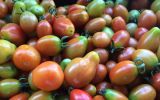
Hundreds of workers have been stood down from three Adelaide tomato producers – including Australia’s largest – amid alarm at a damaging agricultural virus outbreak.
South Australian Premier Peter Malinauskas and Primary Industries Minister Clare Scriven said Perfection Fresh had been closed as a quarantine response to the outbreak that emerged a month ago.
It is understood Perfection Fresh had almost 500 workers.
The state government said two other companies had also been shut: Gawler River Tomatoes and SA Tomatoes.
The shutdown is expected to last weeks.
It follows more than 2500 tests at the three businesses that showed the virus had spread further in the three properties than initially thought, prompting the shutdowns.
The state government assisting affected workers, many of whom are migrant workers, via a task force helmed by the Department of Primary Industries and Regions.
The task force will also destroy crops and manage a clean-up and disinfection effort that is “likely to need a significant number of workers and may provide opportunities for impacted workers”, the government said.
Perfection Fresh said on Wednesday its Two Wells glasshouse was the largest in the southern hemisphere at 43 hectares. It specialises in indoor-grown tomatoes, as well as other fruits and vegetables.
Premier Peter Malinauskas said the company was the “biggest producer of tomatoes in the country”.
It follows the quarantine of two northern Adelaide properties in August as investigations began into the discovery of a “highly contagious” and threatening fruit virus for the first time in Australia.
DPIR said at the time that tomato brown rugose fruit virus (ToBRFV) was detected at two properties.
The highly contagious exotic virus affects tomatoes, capsicums and chillies, and is regarded as a “considerable threat” to Australia’s $5.8 billion vegetable industry.
It leaves fruits with brown wrinkled spots, deformations and uneven ripening, impacting their yield and marketability.
It has been known to infect up to 100 per cent of a crop, with yield losses of 25-70 per cent reported from outbreaks around the world, according to British authorities.
The virus does not have any known effect on people.
Queensland, Western Australia and New Zealand all restricted South Australian tomato imports after the discovery of the virus. With the discovery of a case of ToBRFV detected at a third property, WA widened its ban while New Caledonia also introduced restrictions.
“The objective here is to contain the virus and then seek to eradicate it,” Malinauskas said on Wednesday.
“That may or may not be possible. But where we have the chance to achieve it, we simply must go for it, and that’s what we’re doing by taking this significant action.”
SA PIRSA plant and invasive species biosecurity director Nick Secomb said the level of disease “warrants further attention”.
“This is something that we will be considering at a national level,” he said.
Secomb said the capsicum and tomato growing industry in South Australia was worth about $230 million annually.
“These three businesses combined would be less than 10 per cent of that industry,” he said.
“It’s still a significant cost and a significant impact on these businesses but we take these measures with a wider industry in mind.”
Tomato production in Australia is concentrated in SA and Victoria. The South Australian tomato industry was valued at $179.8 million in 2022-23, with 57,970 tonnes produced,
This is an edited version of a story that first appeared in InDaily. Read the original here










